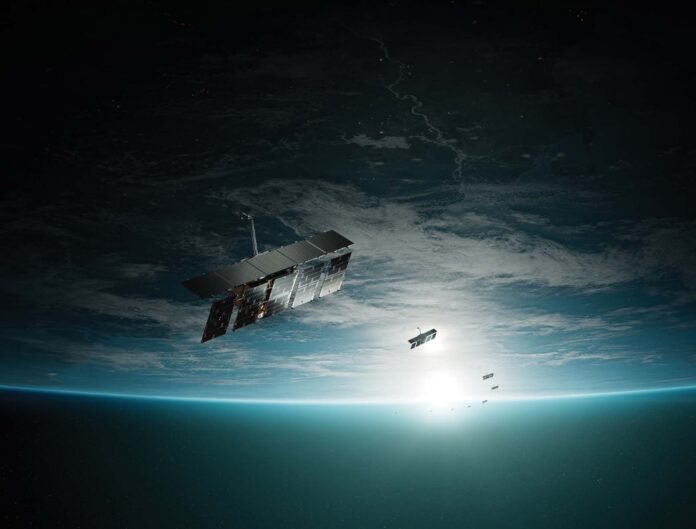Bengaluru. As India celebrates its second National Space Day, marking it two years since Chandrayaan-3 touched down near the Moon’s south pole, the country’s space story is no longer just about rockets and lunar milestones. It is also about security, surveillance, sovereignty, and control.”
Behind the fanfare, India is quietly building a space ecosystem with defence at its core — one where start-ups, international firms, and state agencies are working together to ensure the nation never flies blind in a contested world.
“Eyes in the Sky: India’s Space Race Turns Tactical”
For decades, the Indian Space Research Organisation (ISRO) was seen primarily as a development agency — building satellites to predict the monsoon, connect villages, and aid farmers. Today, the conversation is very different.“Space is no longer just about science. It’s about security,” said a senior defence official.Alongside ISRO, the Defence Research and Development Organisation (DRDO) has emerged as a crucial partner in this shift. While ISRO provides the launch capabilities, satellites, and navigation systems, DRDO is developing complementary technologies for strategic applications — from electronic countermeasures to futuristic anti-satellite systems. Together, the two agencies represent India’s growing recognition that space is as much about security and sovereignty as it is about science and development.
India’s armed forces already rely on satellites like RISAT (Radar Imaging Satellites) for reconnaissance, Cartosat for high-resolution mapping, and EMISAT for electronic intelligence. But the next frontier is a constellation of smaller satellites that can deliver near-real-time data — a capability China and the United States already boast.
The Power of SAR
At the heart of this push is a technology called Synthetic Aperture Radar (SAR). Unlike optical cameras, SAR doesn’t care if it’s cloudy, foggy, or dark. It sends out radar signals and measures their reflections, creating sharp images of the ground.
For the military, SAR is a game-changer. It can:
- Spot troop movements across the Line of Actual Control in the Himalayas, even under cloud cover.
- Track vessels in the Arabian Sea and Bay of Bengal at night.
- Detect construction at air bases, missile sites, or bunkers.
- Help rescue teams map flooded regions when drones and helicopters can’t fly.
“Optical satellites are like our eyes, but SAR is like night vision goggles,” says an industry expert. “You can’t run a modern defence system without it.”
Start-ups and the New Space Rush
India’s start-up boom is fuelling this shift. More than 200 space-tech companies have sprung up in just the past five years, thanks to a liberalised policy regime and the support of IN-SPACe, the government’s space regulator and facilitator.
India’s space startup ecosystem is rapidly taking shape, driven by private innovation alongside ISRO’s legacy. Companies like Skyroot Aerospace and Agnikul Cosmos are racing to build cost-effective, flexible launch vehicles, while Pixxel is deploying hyperspectral satellites for earth observation. Others are working on AI-driven platforms that can analyse satellite images to flag unusual activity at borders in real time.
The Defence Ministry, which once relied almost entirely on ISRO, is now scouting these private players for faster, more flexible solutions.
ICEYE: The Finnish Radar Giant
One foreign company already making waves globally and in India is ICEYE. Headquartered in Finland, and founded only a decade ago, ICEYE operates one of the world’s largest SAR satellite constellations, with dozens of agile, multi-generational satellites in orbit.
Unlike traditional bulky radar satellites, ICEYE’s spacecraft are miniaturised, making them cheaper to launch and quicker to replace. Their images are detailed enough to detect vehicles, ships, even aircraft. Globally, ICEYE’s data has been used in conflict monitoring, maritime security, and disaster relief.
For India, ICEYE offers both a model and a partner. The company has been exploring partnerships with Indian companies and Government agencies to support sovereign ownership of satellite missions as well as imagery and analysis requirement for security and disaster management.
“India is a strategic growth market for ICEYE,” says Pavitra Goel, ICEYE’s Mission Director in India. He further states “There is a clear demand for all-weather, day-and-night satellite intelligence, and our satellites are designed precisely for that need with proven success across several sovereign government customers. .”
The Road Ahead
The government has cleared plans for dozens of new satellites, with a clear emphasis on reconnaissance, communication, and navigation. Start-ups are experimenting with AI-driven analytics, earth observation sensor payloads, while global firms like ICEYE are adding proven capabilities to the mix.
India’s emerging space ecosystem is being shaped by the imperatives of speed, scalability, and sovereignty, outpacing legacy approaches. India’s challenge lies in accelerating growth while securing access to strategically critical global technologies, enabling it to rapidly scale and position itself alongside the world’s leading space powerIn this new space race, SAR constellations will be the backbone — providing the persistent, all-weather eyes that India’s military and policymakers need to secure its borders and seas. As one defence analyst noted: “The future of national security is orbital, and the countries that control the sky will control the narrative.”





